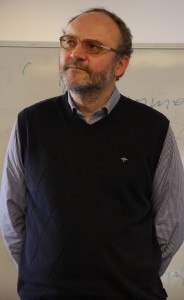
November 25 brought some fresh air to AY and BA students: Professor Norbert Blößner, guest lecturer at ECLA, addressed the formal aspect of Plato’s Republic. Blößner is a specialist in early and classical philosophy, particularly Plato’s dialogues. He studied at the University of Regensburg, were he received his PhD; and is currently working on Plato’s “Politeia” and participating in the Excellence Cluster Topoi.
Professor Blößner began by pointing out some basic aspects of this classic text: “What is the main question in the Republic? In the first place: what is justice? Thereafter, the question arises as to whether it pays or not to be just. If we conduct an analysis of these issues, we will encounter two different levels. The descriptive meaning of adjectives constitutes the first level, and the value those adjectives have is the second. When it comes to justice, everyone may have a different opinion as regards descriptive meaning – what justice is – however, everyone agrees on the second level of analysis: that being just is good”, he stated.
In order to be able to answer the main question in the Republic, one should be able to determine the variables that define such interrogation: justice – or the just – and the good. This is exactly the process that Socrates develops. Blößner stopped here to highlight another important aspect of the dialogue. “Socrates makes a big argument without knowing if he is right, or stating that he knows for certain. He improvises a discussion. This is very important for the analysis of dialectic narrative”, he said. We should ask ourselves what does it mean that the philosopher doesn’t have all the answers; what does Plato make of this dialectical construction?
According to Blößner, Socrates plays two different roles. There’s the “Historical Socrates”, that is only questioning and doesn’t state anything; and there’s the “Answering or Stating Socrates”, who has arguments. The later doesn’t only contradict the opinion of others, but also has his own opinions.
In this way, the guest lecturer went on to challenge one of the most popular theories on the Republic: that Socrates is Plato’s mouthpiece. But, so claims Blößner, the dialogue is not telling us what the disciple thinks, it’s something else. It is about the importance of argument, why it is essential. “Argument is needed; otherwise, Socrates as an educator would have failed. He needs to allow for discussion. As a philosopher, he has to live a life that is justified, he has to give reasons why he decides to live in a just way. Otherwise, his life has no meaning”, he stated.
Here is where the presence of the characters Glaucon and Adeimantus play an important role: they are young, they have to make a decision as how to live their lives, and one cannot live one’s life on the basis of opinions. However, we cannot achieve true or comprehensive knowledge. We only come close to it, we strive for it. This brings a paradoxical conception: why should we strive to achieve knowledge if its successful attainment is impossible?
Going back to the first question, Blößner described the three steps Socrates takes in order to determine what justice is and whether it pays for someone to be just. Firstly, he describes the ideal city, and how justice and injustice arise in it. Secondly, he details how this regime becomes corrupted, and moves on to describe the four regimes, saying which is more just and which more unjust. He also describes each soul that corresponds to each city. Finally, on a third step, he compares the most just to the most unjust regime and says which one corresponds to happiness.
For timocracy, happiness means being the primary person (something similar to an Olympian winner); in oligarchy, it consists of having wealth; for democracy, happiness means having no rules; and in a tyrannical regime, it is about having true or absolute power. In this way, happiness turns into an objective value, it is analyzed from outside the person, somebody else decides for the individual. “All of these visions of happiness are egoistic. The good or happiness is not divisible. The real good is found in the city-in-speech, because it takes into consideration the community as a whole.
Some people say Socrates sacrifices the happiness of the citizens for the happiness of the city, but this is not true: the polis IS the people, not the houses or streets”, our guest lecturer explained. Is it possible, then, to realize such an ideal order? No, Blößner says, because people don’t have a clear knowledge of the good. True knowledge – of fundamental values, in this case – and the good city are only possible, then, as approximations.
by María Cruz (AY ’10, Argentina)
